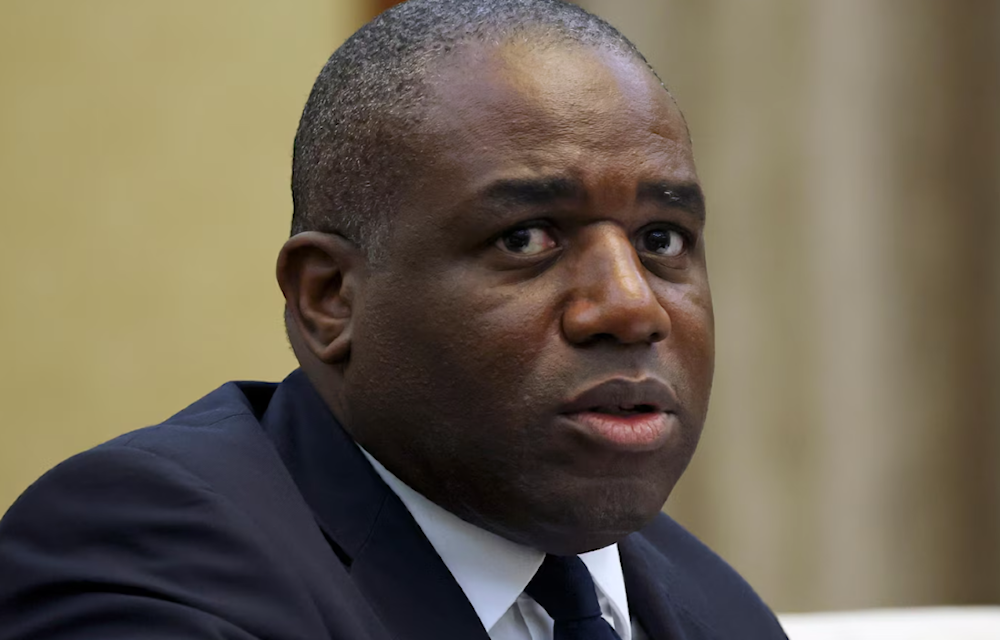UK’s top diplomat says slavery reparations ‘not about cash’
A spokesperson for Starmer formerly revealed last month the UK will neither be apologizing for slavery nor paying reparations.
-

Britain's Foreign Secretary David Lammy attends a meeting with Chinese Vice Premier Ding Xuexiang at the Great Hall of the People in Beijing, China, Friday, October 18, 2024. (AP)
Foreign Secretary David Lammy announced that the UK plans to address the legacy of the transatlantic slave trade by strengthening trade ties with African nations.
This week, Lammy is visiting Nigeria and South Africa as part of London's efforts to engage with the continent, coming just days after 56 Commonwealth states signed a declaration advocating for a "conversation" on reparations for slavery.
Describing the transatlantic slave trade as "horrific and horrendous," Lammy acknowledged the lasting "scars" it has left when speaking on Monday in Lagos, Nigeria, a former hub of the slave trade.
"I am the descendant of enslaved people, so I recognize that," Lammy stated.
Lammy's parents are Guyanese immigrants in the UK. British officials had transported numerous African and Indian slaves, as well as indentured laborers, into the old South American mainland colony.
The foreign secretary told BBC that reparations are "not about the transfer of cash," particularly given the UK's current cost-of-living issue. Instead, he claimed that emerging countries may gain from the transfer of British scientific and technological knowledge.
Starmer was responding to allegations that a consortium of Caribbean countries planned to seek £200 billion ($261 billion) in compensation for the agony and suffering caused by the transatlantic slave trade.
While the British Prime Minister insisted that reparations would not be discussed at last week's Commonwealth meeting in Samoa, 56 member states signed a statement declaring slavery a "crime against humanity" and calling for "discussions on reparatory justice with regard to the transatlantic trade in enslaved Africans and chattel enslavement."
UK, not concerned with past, refuses to pay ex-colonies reparations
Speaking to AFP, Sascha Auerbach, director of the Institute for the Study of Slavery at Nottingham University, said few factions of British society are open to the idea of reparations, but the majority remains in strong opposition.
A recent summit in Samoa saw 56 members of the Commonwealth declaring that the "time has come" to discuss the legacy of the transatlantic slave trade, marking a significant moment that could lead to future reparations. The nations urged Britain and other former colonial powers to apologize for slavery and the harms of colonization, as well as initiate discussions on compensation.
However, UK Prime Minister Keir Starmer, a human rights lawyer, rejected both requests, claiming he wants to look forward rather than revisit the past and have "very long endless discussions about reparations."
Robert Jenrick, a candidate for the new Tory leadership, has stated that criticizing the British Empire is unpatriotic, noting that "territories colonized by our empire were not advanced democracies."
"Many had been cruel, slave-trading powers. Some had never been independent. The British empire broke the long chain of violent tyranny as we came to introduce -- gradually and imperfectly -- Christian values," he added.
Although Britain has acknowledged its historical role in slavery with expressions of remorse, it has hesitated to consider financial reparations due to the potentially high costs.
A 2023 report by United Nations judge Patrick Robinson estimated that the UK might owe over £18 trillion (or 21 trillion euros) for its involvement in slavery across 14 countries, factoring in unpaid wages, the trauma inflicted, and damages owed to descendants. Thus far, Commonwealth nations have not proposed their own reparations figures.
However, it does seem that the nations do not want monetary compensation as much as accountability and recognition. Critics in the UK argue that a public apology could lead to legal action against the country, although the Dutch government and king issued an apology for slavery last year but have not faced any lawsuits so far.
The British royal family has yet to issue a formal apology. However, during a visit to Kenya last year, King Charles III expressed his "greatest sorrow and deepest regret" for the "abhorrent and unjustifiable acts of violence" inflicted on Kenyans during colonial rule.

 4 Min Read
4 Min Read








